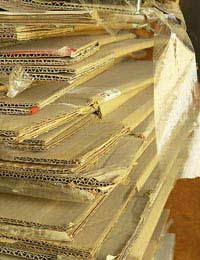How to Avoid Excess Packaging

Many products that we buy are over-packaged and as soon as we get home the packaging gets thrown in the bin, or at best the recycling. Packaging now accounts for a third of all household waste.
The government has taken legislative measures to force businesses to stop using “excessive” amounts of packaging. To cut down on packaging even more, consumers need to be on board too.
Packaging comes in the form of unnecessary plastic wraps on food, carrier bags. boxes and more.
Why Cut Down on Packaging?
There are lots of good reasons to make a conscience effort to avoid too much packaging:- The manufacturing of packaging wastes energy and resources. Even if the packaging can be recycled this still uses up resources.
- Excess packaging contributes to our litter problem. Out streets are often strewn with food packaging and wrappers. Litter is an eyesore but can also be harmful to wildlife.
- Most packaging ends up in landfill where it takes a long time to decompose. When it does decompose landfill waste can give off harmful gases and toxins which pollute the air and water. Further, landfill spaces are rapidly running out and an alternative needs to be found.
Ways to Avoid Excess Packaging
There are many small steps that can be taken to reduce the amount of packaging that we use.- Avoid buying fruit and vegetables that come in plastic trays or are wrapped in plastic. Fruit and veg comes in its own natural packaging but some supermarkets still wrap it in extra packaging. Make a stand - if more people refuse this packaging supermarkets will be forced to reconsider.
- Buy in bulk. Buying in bulk saves a lot of packaging. You can buy all sorts of goods such as flour, rice, cereal, coffee, sugar, nuts and dried fruit loose. These products can be stored in their original packaging or airtight containers can be found in hardware shops easily. Bulk products can be bought in health food stores and also in many markets and loose food shops now.
Buying items such as yoghurt, cheese and meat in larger quantities will also save packaging and money. Any excess can often be frozen for later use or used straight away for large families.
- Cut down on takeaways. Takeaway wrappers and packages makes up a large percentage of packaging waste. Packing food and drinks if you’re going to be out and about will cut down on this. You can also use your own cup or flask in many coffee shops these days too.
To avoid the takeaway temptation try doing some batch cooking and freezing meals like lasagne and curry. On days when you can’t be bothered you’ll have your own ready meals that will be ready in the time it would take for a takeaway to be delivered.
- Buy re-usable, rather than disposable, items wherever possible. This cuts down on a lot of packaging over time. Re-usable versions of many products are available including batteries, sanitary protection, nappies and batteries. Our article ‘Great Ways to Avoid Disposable Products’ provides more information on this.
- Where packaging is unavoidable, look for packaging that’s made from recycled products and which is recyclable.
Efforts to avoid excess packaging will soon add up and you may be surprised at how quickly and significantly the amount of waste in your bin and recycling box shrinks.
- Interview With a Charity Shop Worker
- A Guide to Buying Recycled Goods
- Great Ways to Avoid Disposable Products
- All about Give Away Shops
- Giving Your Used Goods to Charity: Does it All Get Used?
- Freeganism: Is it Safe?
- What You Can Do With Old Electrical Goods
- Great 'Green' Ways to Re-Use Your Carrier Bags
- All About Freeganism and Dumpster Diving


Re: How Do I Dispose of My Broken Fridge Freezer?
I have paid to the council to collect 2 Fridges. But they wanted to leave it in front of my house. I…
Re: How Do I Dispose of My Broken Fridge Freezer?
I have a American fridge freezer to get rid of
Re: How Do I Dispose of My Broken Fridge Freezer?
I have a chest freezer that needs removal NOT
Re: How Do I Dispose of My Broken Fridge Freezer?
I have two fridges to get rid of standard size
Re: How Do I Dispose of My Broken Fridge Freezer?
Unwanted Fridge freezer need to be removed. Thanks
Re: How Do I Dispose of My Broken Fridge Freezer?
i have a fridge freezer , not needwd anymore , who can i contact to pick up from Qurinidi nsw?
Re: How Do I Dispose of My Broken Fridge Freezer?
Need a fridge freezer uplifted got a new one
Re: How Do I Dispose of My Broken Fridge Freezer?
David - Your Question:Hi. I've got a small chest freezer in good working order I need someone to take it…
Re: How Do I Dispose of My Broken Fridge Freezer?
Hi. I've got a small chest freezer in good working order I need someone to take it away as I've just bought…
Re: How Do I Dispose of My Broken Fridge Freezer?
Hi I have an American fridge freezer still works but sometimes leakes water how do I dispose of it that…